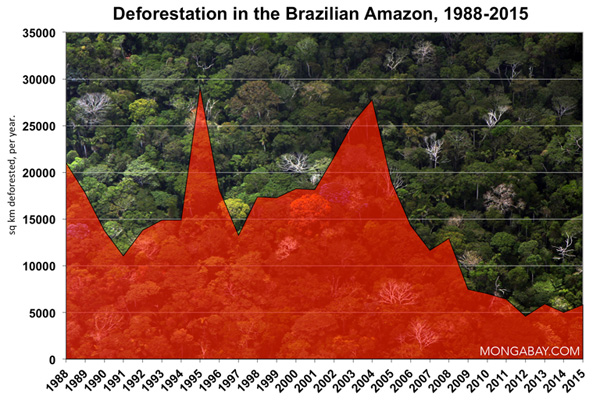 Deforestation in the Brazilian Amazon.
Deforestation in the Brazilian Amazon.
Brazilian President Dilma Rousseff today rejected 12 of 84 articles in a controversial bill that aims to relax restrictions on deforestation in the Amazon rainforest. The Brazilian government will announce the full details of the cuts on Monday.
Environmentalists had pressured Rousseff to outright veto the measure, which they said could reverse Brazil’s progress in reducing its deforestation rate. But a presidential veto could have been overruled by Congress.
The revised version of the Forest Code raised concerns among greens and scientists for provisions that would have granted amnesty for illegal deforestation and reduced the amount of forest landowners are required to protect. The looser Forest Code seemed to be opposed by the general public, according to surveys conducted by environmentalists. The Forest Code revision was pushed by agroindustrial interests in the Congress.
The revision put Rousseff in an awkward position ahead of the Rio+20 UN Conference on Sustainable Development, which Brazil is hosting next month. Had she approved the measure in full, it would have undermined the conference. Had she vetoed the bill, her veto would have likely been nullified by Congress. Thus her partial vote had been expected.
The implications of the new Forest Code won’t be known until Dilma’s office issues her executive order Monday.
“President Rousseff has apparently acceded to Brazilian public opinion in vetoing the most flagrantly irresponsible sections of the ranchers’ Forest Code, but we’re not out of the woods yet,” said Jennifer Haverkamp, International Climate Program Director at the Environmental Defense Fund (EDF), in a press release. “What these vetoes really mean for the future of the forest — and whether the law can be effectively enforced — will depend on the specifics of the executive order (Medida Provisória) that the President will issue on Monday.”
But environmental groups were already criticizing her decision not to completely reject the bill.
“President Dilma’s vague delivery of vetoes and modifications to new Forest Code leaves the people of Brazil without any assurances that the Amazon will be protected,” said Paulo Adario, Greenpeace Brazil’s Amazon Campaign Director, in a statement. “One thing is clear, Dilma has ignored the 80 percent of Brazilians who opposed the changes to the current Forest Code and all those that demanded a full veto.”
“For the last decade, Brazil has been on a path of economic and environmental progress. President Rousseff’s statement today creates an uncertain future for Brazilian forests, considering the Congress could still cut forest protections even further,” added Jim Leape, WWF International Director General, in a press release.
The Brazilian Amazon accounts for more than 60 percent of the Amazon, the world’s largest rainforest. The region stores tens of billions of carbon, is home to millions of species, and provides ecosystem services to much of the South American continent — roughly 70 percent of South America’s GDP is produced in areas within the rain shadow of the Amazon. Scientists fear that continued deforestation could reduce the resilience of the Amazon to climate change, potentially tipping much of the ecosystem from rainforest to savanna and diminishing its capacity to generate rainfall.
Related articles
Brazil can eliminate deforestation by 2020, says governor of giant Amazon state

(04/05/2012) Brazil can reduce Amazon deforestation to zero by 2020 while boosting rural livelihoods and maintaining healthy economic growth, the governor of Pará told mongabay.com on the sidelines of the Skoll World Forum, a major conference on social entrepreneurship, last week. Governor Simao Jatene is hopeful that a revolution in land management and governance can turn the tide in Pará, a state that is three times the size of California and has lost more Amazon forest — 90,000 sq km of Amazon forest since 1996 — over the past decade-and-a-half than any other in Brazil.
Brazil’s Congress OKs weakened version of forest law; environmentalists outraged
(04/26/2012) Brazil’s Congress on Wednesday approved controversial changes to the country’s Forest Code, a move supporters argue will simplify environmental laws and ease agricultural expansion, but environmentalists say will spark deforestation and grant amnesty for past illegal logging. The measure needs to be approved by President Dilma Rousseff to become law.
Rally calls on Brazil President to veto new forest code

(03/07/2012) A coalition of 200 organizations, known as the Comitê Brasil in Defense of Forests and Sustainable Development, rallied today in Brasilia against proposed changes to Brazil’s Forestry Code. The code, which was supposed to be voted on this week but has been delayed to shore up more support, would make changes in over 40-year-old code that some conservationists fear could lead to further deforestation in the Amazon. Protestors called on the President of Brazil, Dilma Rousseff, to veto the bill as it stands now, holding signs exclaiming, “Veta Dilma!” (“Veto it Dilma!”).
Is the Russian Forest Code a warning for Brazil?

(12/19/2011) Brazil, which last week moved to reform its Forest Code, may find lessons in Russia’s revision of its forest law in 2007, say a pair of Russian scientists. The Brazilian Senate last week passed a bill that would relax some of forest provisions imposed on landowners. Environmentalists blasted the move, arguing that the new Forest Code — provided it is not vetoed by Brazilian President Dilma Rousseff next year — could undermine the country’s progress in reducing deforestation.
Science has been nearly silent in Brazil’s Forest Code debate
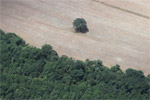
(08/09/2011) A recent push to revise Brazil’s forest code has emerged as one of the more contentious political issues in the country, pitting agribuisness against environmentalists trying to preserve the Amazon rainforest. Historically, the forest code has required private landowners to maintain a substantial proportion of natural forest cover on their properties, though the law has often been ignored. While both sides claim to be basing their recommendations on the ‘best science’ available, Brazilian scientists say they haven’t had much of a voice in the debate. In fact, says Antonio Donato Nobre, a researcher at the Amazon Research Institute and Brazil’s National Space Research Institute, ‘throughout the development of the said revisions, Congress has neither invited nor commissioned a coordinated and serious contribution from the scientific community.’
Proposed changes to Brazil’s Forest Code could hurt economy
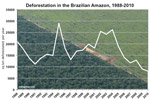
(07/13/2011) Proposed changes to Brazil’s Forest Code will hurt Brazilian agriculture, argues a leading conservationist. Carlos Alberto de Mattos Scaramuzza, WWF-Brazil’s director for conservation, says the reform bill currently being evaluated by Brazil’s Senate could have unexpected economic implications for Brazilian ranchers and farmers. Scaramuzza says a bill that grant amnesty for illegal deforesters and sanctions expanded destruction of the Amazon rainforest would make Brazilian agricultural products less attractive in foreign markets.
Forest Code bill could undermine sustainable growth in the Amazon

(07/06/2011) In May Brazil’s House of Representatives passed a bill that will reform the country’s Forest Code, which requires farmers and ranchers in the Amazon to maintain a legal forest reserve amounting to 80 percent of total landholdings. Environmentalists say the bill, which is undergoing revision before heading to the Senate next month, would weaken the forest code, granting amnesty for illegal deforestation of up to 400 hectares per property and allowing clearing of forests along waterways and on hillsides — restrictions meant to limit erosion and damage to watersheds.
Brazilian senator: Forest Code reform necessary to grow farm sector
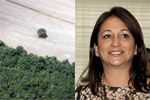
(07/06/2011) Over the past twenty years Brazil has emerged as an agricultural superpower: today it is the largest exporter beef, sugar, coffee, and orange juice, and the second largest producer of soybeans. While much of this growth has been fueled by a sharp increase in productivity resulting from improved breeding stock and technological innovation, Brazil has benefited from large expanses of available land in the Amazon and the cerrado, a grassland ecosystem. But agricultural growth in Brazil has always been limited — at least on paper — by its environmental laws. Under the country’s Forest Code, landowners in the Amazon must keep 80 percent of their land forested.
Majority of Brazilians reject changes in Amazon Forest Code
(06/11/2011) The vast majority of Brazilians reject a bill that would weaken Brazil’s Forest Code, according to a new poll commissioned by green groups.
Brazil’s plan to save the Amazon rainforest

(06/02/2009) Accounting for roughly half of tropical deforestation between 2000 and 2005, Brazil is the most important supply-side player when it comes to developing a climate framework that includes reducing emissions from deforestation and forest degradation (REDD). But Brazil’s position on REDD contrasts with proposals put forth by other tropical forest countries, including the Coalition for Rainforest Nations, a negotiating block of 15 countries. Instead of advocating a market-based approach to REDD, where credits generated from forest conservation would be traded between countries, Brazil is calling for a giant fund financed with donations from industrialized nations. Contributors would not be eligible for carbon credits that could be used to meet emission reduction obligations under a binding climate treaty.
Future threats to the Amazon rainforest
(07/31/2008) Between June 2000 and June 2008, more than 150,000 square kilometers of rainforest were cleared in the Brazilian Amazon. While deforestation rates have slowed since 2004, forest loss is expected to continue for the foreseeable future. This is a look at past, current and potential future drivers of deforestation in the Brazilian Amazon.
Half the Amazon rainforest will be lost within 20 years
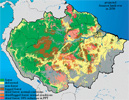
(02/27/2008) More than half the Amazon rainforest will be damaged or destroyed within 20 years if deforestation, forest fires, and climate trends continue apace, warns a study published in Philosophical Transactions of the Royal Society B. Reviewing recent trends in economic, ecological and climatic processes in Amazonia, Daniel Nepstad and colleagues forecast that 55 percent of Amazon forests will be “cleared, logged, damaged by drought, or burned” in the next 20 years. The damage will release 15-26 billion tons of carbon into the atmosphere, adding to a feedback cycle that will worsen both warming and forest degradation in the region. While the projections are bleak, the authors are hopeful that emerging trends could reduce the likelihood of a near-term die-back. These include the growing concern in commodity markets on the environmental performance of ranchers and farmers; greater investment in fire control mechanisms among owners of fire-sensitive investments; emergence of a carbon market for forest-based offsets; and the establishment of protected areas in regions where development is fast-expanding.